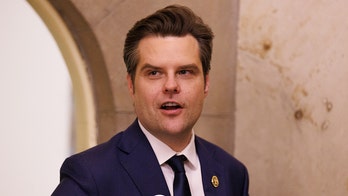TUPELO, Miss. -- From a former Delta flight attendant to the mother of a fallen Iraq Navy SEAL, the activists and organizers aboard the Tea Party Express each seem to represent a slice of America.
Travelers on the tour, a three-bus caravan barnstorming the country in protest of the Washington establishment, claim to be brought together by common principles: small government, less spending and a fierce defense of individual freedom.
But a lot of Americans hold those values. So who are these people who drop everything to spend weeks on the road on a bus talking about the Constitution and turning '60s-style activism on its head?
Some are folksy, some are strictly business. Everyday Americans make up the bulk of those on board and at the rallies, but there's also a strong organizing factor that makes the cross-country tour, which is on its third run and starting to carry some political heft, what it is.
By some appearances, the highly coordinated rallies and pulse of the 42-city national bus tour have all the markings of a political campaign.
Staff members work 18-hour days, seven days a week, and the chief strategist behind the group, Sal Russo, is a longtime Republican consultant from California who began his political career as a personal aide to Ronald Reagan.
Russo, who is head of the Sacramento-based political action committee, Our Country Deserves Better, which is funding the bus tour, has 40 years of political consulting under his belt. In the mid-1980s, Russo joined forces with former Reagan campaign director Ed Rollins to start a political consulting firm, which took on clients like former Republican vice presidential nominee Jack Kemp.
"It has all the intensity of a campaign, but more like an old-fashioned one," Russo said of his group as the bus rolled along a stretch of highway en route from Arkansas to Mississippi. "We don't have a high-paid staff."
"The Tea Partiers remind me very much of the Reagan crowds of 1966," he added. "But this is a movement, not a party."
The Tea Party Express set off on its first national tour last August to protest the tax-and-spend policies of Congress and to cement its message with the thousands of other Tea Party factions that had formed around the country, said Joe Wierzbicki, one of the group's founding members.
The second bus tour launched in October, largely as an effort to debunk rumors that the Tea Party movement was nothing more than a passing fad.
This time around, Wierzbicki said, the purpose of the "Just Vote Them Out" tour is more exact: "To start putting together the campaigns that will change who's in office in 2010."
He added. "And health care has created the perfect storm for that."
At the tour's weekend stop in Little Rock, Ark., Tea Partiers targeted Arkansas Democratic Sen. Blanche Lincoln in large part over her support for the health care legislation.
The money raised by the Tea Party Express is hardly loose change. Russo's PAC raked in more than $4.5 million since forming in 2008 to help John McCain's presidential campaign -- some of it from corporate executives and high-end donors like actor Chuck Norris. Russo said the Tea Party bus tour will cost close to $1 million by the time it concludes in Washington on April 15, tax day -- a hefty sum he claims was entirely paid for by "ordinary folks" donating to his PAC.
Roughly 15 staff members, four entertainers and a dozen speakers ride in the red, gold and blue buses that have meandered across the country. A colorful map of the 50 states is painted on each side with the group's mission statement printed clearly: "Stop the out of control spending! No government run healthcare! Stop raising our taxes!"
Some organizers have given up their regular lives to work full-time for the Tea Party Express -- like Tiffiny Ruegner, a massage therapist and single mother from Sacramento, Calif., who lost 90 percent of her clientele last summer after the economy crashed.
"You have all these people who are in different situations in life," said Wierzbicki. "Some of them are married with kids and they have to leave their families for extended periods of time and it's difficult for them."
Debbie Lee, from Phoenix, took to the road after she lost part of her family.
In 2006, Lee was celebrating her birthday with friends when she learned that her son, Marc, was the first Navy SEAL to be killed in Iraq. Now, four years later, Lee is a familiar face at Tea Party rallies, speaking before crowds about the sacrifices of military families.
She says her son's death inspired her to join the movement, which she described as a place for people "who have never before attended political rallies."
The everyday logistics aboard the Tea Party Express don't always run smoothly, a sign that the movement's not quite as polished as its critics would make it out to be. Working toilets, an adequate food supply and scheduling dilemmas are sometimes problems for the over-stretched staff.
"The toilet's clogged -- again!" snapped bus driver Raymond March in the middle of one recent leg.
But Russo said the movement, like others before it, is only for believers.
"You can't do this kind of thing unless you believe in the cause," he said. "Everybody who's involved in this feels passionately about what we're doing. It's not about the money and it's not about the hours."




